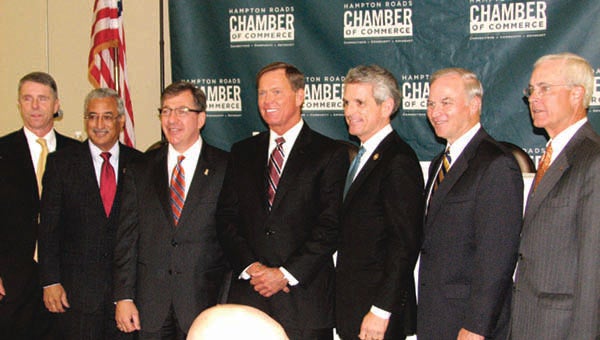Iran, military topics at forum
Published 1:56 pm Friday, October 16, 2015

Posing for a group photo during the Hampton Roads Chamber of Commerce’s congressional forum Wednesday at the Chesapeake Conference Center are, from left, Rep. Rob Wittman, Rep. Bobby Scott, Chamber Board of Directors Chair Joe Witt, Chamber President and Chief Executive Officer Bryan Stephens, Rep. Scott Rigell, Rep. Randy Forbes and Charlie Henderson, Hampton Roads market president of Bank of America, the event’s presenting sponsor. — Tracy Agnew | Suffolk News-Herald
By Tracy Agnew
Special to the Tidewater News
CHESAPEAKE
Four congressmen addressed sequestration’s effect on the military, the possibility of base closures and other issues at a congressional forum Wednesday held by the Hampton Roads Chamber of Commerce at the Chesapeake Conference Center.
All four congressmen in attendance agreed sequestration is bad for the nation and the military in particular and that a Base Realignment and Closure round would be harmful to localities.
“The lifting of sequestration has got to be done,” said Rep. Scott Rigell (R-02). The forced spending cuts are threatening the nation’s ability to defend itself, he said.
“We’ve got a lot of threats facing our country,” he said.
Rep. Randy Forbes (R-04), whose district includes Suffolk, said the spending cuts have forced the military to an unacceptable level of readiness. The Air Force is the smallest and oldest in its history, with less than half of its aircraft ready for high-end combat; the Navy is on the verge of being only a regional power rather than a superpower; and the Army says it would take them five years to get back to where they were 10 years ago.
“If you believe that’s where we should be, you should support a BRAC,” he said, referring to a question about the possibility of a Base Realignment and Closure round, the process through which the Department of Defense decides to close military bases.
Forbes said President Barack Obama’s administration wants a BRAC.
“We are doing everything we can to make sure a BRAC doesn’t occur,” said Rep. Rob Wittman (R-01).
Rep. Bobby Scott (R-03), the lone Democrat on Wednesday’s panel, also said he doesn’t support a BRAC round.
“Just the idea of a BRAC inflicts terror on states and localities,” Scott said. “When you talk about a BRAC, you hurt localities.”
Scott also said the money saved through BRAC would be “a drop in the bucket” compared to more robust cost-savings measures.
Rigell said the extensive closure costs associated with closing military bases “really negates any of the savings you might think we would see from that. … We just need to get our budget situation right.”
Scott said the problem with the budget is that people who vote for a responsible budget usually get voted out of office the next time they are up for election.
“There’s nothing you can do with the budget that’s politically feasible,” he said.
But fixing the budget is important, he said.
“At the rate we’re going, in 11 years we’ll only have enough money for entitlements and interest on the debt,” Scott said.
The most vigorous disagreement at the forum came on the topic of a deal reached with Iran that aims to keep that nation from acquiring nuclear weapons.
“The only thing worse than the deal is no deal at all,” Scott said.
But his Republican colleagues disagreed.
“Bad deal, bad decision,” Forbes said. “It was done just because the administration wanted to have a deal.”
Forbes denounced the deal’s “snub” of Israel, one of the United States’ greatest allies, while giving leeway to Iran.
“It destabilizes things,” Wittman said. He said he favored exerting U.S. influence and working with allies in the region, such as Egypt, Saudi Arabia and Jordan, to get a better deal.





